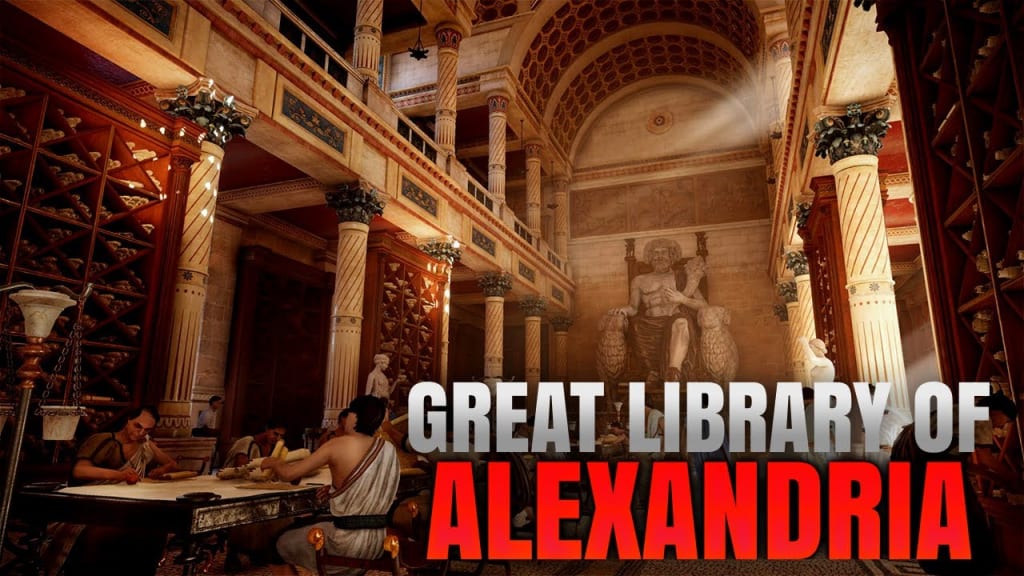What really happened to the Library of Alexandria?
The Great Library of Alexandria in Alexandria, Egypt

A long time back, 2300 years ago, the leaders of Alexandria set off to satisfy perhaps of humankind's most nervy objective: to gather all the information on the planet under one rooftop.
Thriving, the Library of Alexandria housed a remarkable number of parchments furthermore, pulled in a portion of the Greek world's most prominent personalities.
In any case, toward the finish of the fifth century CE, the extraordinary library had disappeared.
Many accepted it was obliterated in a disastrous fire.
The reality of the library's ascent and fall is considerably more perplexing.
The thought for the library came from Alexander the Incomparable.
Subsequent to setting up a good foundation for himself as a champion, the previous understudy of Aristotle turned his consideration to building a realm of information settled in his namesake city.
He kicked the bucket before development started, in any case, his replacement, Ptolemy I, executed Alexander's arrangements for an exhibition hall and library.
Situated in the regal area of the city, the Library of Alexandria may have been worked with terrific Greek segments, local Egyptian impacts, or on the other hand a special mix of the two- - there are no enduring records of its engineering.
We really do realize it had auditoriums, homerooms, and, obviously, racks.
When the structure was finished, Ptolemy I started to fill it with basically Greek and Egyptian parchments.
He welcomed researchers to live and concentrate on in Alexandria without regard to him.
The library developed as they contributed their own original copies, be that as it may, the leaders of Alexandria actually needed a duplicate of each and every book on the planet.
Fortunately, Alexandria was a center for ships going through the Mediterranean.
Ptolemy III organized a strategy requiring any boat that moored in Alexandria to turn over its books for duplicating.
When the Library's copyists had copied the texts, they kept the firsts and sent the duplicates back to the boats.
Employed book trackers additionally scoured the Mediterranean looking for new texts, also, the leaders of Alexandria endeavored to subdue rivals by finishing all products of the Egyptian papyrus used to make scrolls.
These endeavors carried countless books to Alexandria.
As the library developed, it became conceivable to track down data regarding additional matters than any time in recent memory, yet in addition substantially more challenging to track down data on a particular subject.
Fortunately, a researcher named Callimachus of Cyrene set to deal with an answer, making the pinakes, a 120-volume inventory of the library's items, the first of its sort.
Utilizing the pinakes, others had the option to explore the Library's expanding assortment.
They made a few shocking revelations.
1,600 years before Columbus set forth, Eratosthenes not just understood the earth was round, in any case, determined its boundary and distance across inside a couple of miles of their genuine size.
Heron of Alexandria made the world's most memorable steam motor north of 1,000 years prior it was at last rethought during the Modern Upset.
For around 300 years after its establishing in 283 BCE, the library flourished.
However at that point, in 48 BCE, Julius Caesar laid attack to Alexandria also, set the boats in the harbor ablaze.
For a really long time, researchers accepted the library consumed as the burst spread into the city.
It's conceivable the fire annihilated piece of the rambling assortment, however, we know from old compositions that researchers kept on visiting the library for a really long time after the attack.
Eventually, the library gradually vanished as the city changed from Greek, to Roman, Christian, also, ultimately Muslim hands.
Each new arrangement of rulers saw its items as a danger instead of a wellspring of pride.
In 415 CE, the Christian rulers even had a mathematician named Hypatia killed for concentrating on the library's old Greek texts, which they considered to be irreverent.
However the Library of Alexandria and its innumerable texts are a distant memory, we're actually wrestling with the most effective ways to gather, access, furthermore, protect our insight.
There's more data accessible today also, further developed innovation to safeguard it, however we can't be aware without a doubt that our advanced documents will be more impervious to obliteration than Alexandria's ink and paper scrolls.
Also, regardless of whether our supplies of information are actually secure, they will in any case need to oppose the more deceptive powers that destroyed the library: feeling of dread toward information, what's more, the self-important conviction that the past is outdated.
The thing that matters is that, this time, we know what to plan for.
About the Creator
Aksharaasree Raviram
I am a writer interested in writing about the Histories and Mysteries of the world. No matter how much the world grows, history always serves as its roots. Histories are always filled with mysteries and solving the is my great passion





Comments
There are no comments for this story
Be the first to respond and start the conversation.